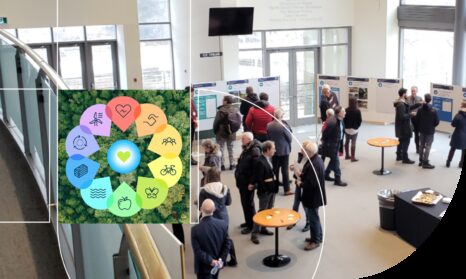Impact review 2022/23
Chief Executive’s foreword
As I reflect on Bioregional’s work across 2022-23, the collective effort to tackle the climate and ecological emergency has never been more important. Seismic climate stories now flicker across our screens at a frightening rate: in July the planet experienced its hottest week on record and wildfires have recently devastated parts of southern Europe, north Africa, Hawaii and Canada. The world is set to break the 1.5C temperature limit within the next four years, it’s now too late to save summer Arctic ice, and the temperature of the world’s ocean surface has hit a record high.
These staggering developments highlight the need for deep and rapid emissions reductions to achieve a liveable future: every tonne of carbon saved matters, and every fraction of a degree matters.
The climate crisis is inextricably linked with the ecological crisis. Action to halt and reverse our damaging impact on the natural world is gaining momentum, with the landmark agreement at COP15 seeing nations agreeing on a historic package of measures deemed critical to addressing the loss of biodiversity and restoring natural ecosystems. The 2030 target for conserving at least 30% of the world’s lands, inland waters, coastal areas, and oceans is now rapidly approaching – and we must all work at pace to achieve it.
At Bioregional, our team has worked tirelessly to help businesses, those working in the built environment, local and national governments, and NGOs from community groups to the United Nations, to play their part in facing the climate and ecological emergency. Our body of work across 2022 was recently recognised in the RESI Awards 2023, where we were delighted to win ‘professional team of the year’. I hope you enjoy reading the rest of this 2022-23 impact review, which is a tremendous showcase of our team’s continued achievements.
It was a year of great change for Bioregional – we celebrated 20 years of BedZED, before moving to Sustainable Ventures – Europe’s largest sustainable business ecosystem – in central London. This has already resulted in new connections, inspiring conversations, and an influx of new talent into our dedicated team.
In the autumn, we were delighted to announce the appointment of Munish Datta to our board of trustees. Munish is currently Director of Sustainability for Specsavers Group and was a key architect of Marks & Spencer’s award-winning “Plan A” sustainability strategy, and we will be delighted to work with him in the years ahead.
Our impact review also contains a summary review of our 2022/23 One Planet Living action plan, which you can view in full here.
The challenge ahead of us is daunting, but not insurmountable. From our work with partners, we know that a world in which everyone can live happily and healthily within the limits of our one planet is achievable. We’re looking forward to taking another step towards making this vision a reality in the year ahead.
Sue Riddlestone OBE,
Chief Executive
Bioregional
Header image: aerial photo of Lincoln, by Matthew Feeney via Unsplash









